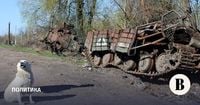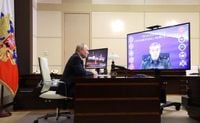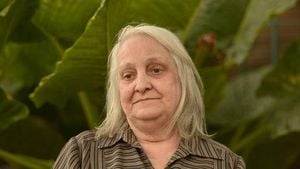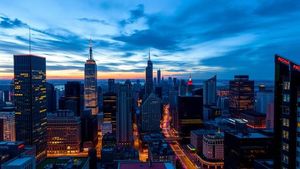On April 26, 2025, the Kursk region was officially declared liberated from Ukrainian forces, marking a significant milestone in the ongoing conflict between Russia and Ukraine. Acting Governor of the Kursk region, Aleksandr Khinshtein, celebrated this event as a historic day for the residents, referring to the liberation as a holiday. The announcement was made during a meeting at Southwestern State University, where Khinshtein expressed the overwhelming joy felt by the community upon hearing the news from the Chief of the General Staff, Valery Gerasimov, who reported the complete liberation to President Vladimir Putin.
Gerasimov detailed the military operation that led to this outcome, stating that the last populated area to be freed was the village of Gornal. He highlighted the exceptional performance of various military units, including the 22nd motorized rifle regiment of the 72nd division and the marine brigades, which played crucial roles in the operation. According to Gerasimov, the offensive actions initiated on March 6, 2025, effectively isolated and dismantled the Ukrainian forces that had invaded the region.
"Today, the last populated point in the Kursk region was liberated from Ukrainian units," Gerasimov reported to Putin, emphasizing that the encirclement of Ukrainian armed formations had been completed. This operation not only marked the end of significant hostilities in Kursk but also aimed to disrupt Ukraine's strategic plans in the broader context of the war.
Putin responded to the report with gratitude, thanking the military personnel for their efforts in liberating the region. He stated, "The complete defeat of the enemy in the Kursk border area creates conditions for further successful actions of our troops on other important sectors of the front." This sentiment reflects the Kremlin's perspective that the liberation of Kursk will bolster Russian military operations elsewhere.
The conflict in the Kursk region has been ongoing since August 6, 2024, when Ukrainian forces launched an offensive that initially captured significant territory. The fighting has lasted for approximately nine months, during which time Ukrainian troops faced heavy losses. According to Russian military estimates, over 76,000 Ukrainian soldiers have been killed or wounded throughout the course of the conflict, with recent reports indicating that Ukrainian forces were forced into a defensive posture as Russian troops advanced.
As fighting intensified, the situation for civilians in the region deteriorated. Reports indicate that approximately 200 civilians lost their lives, and around 500 were injured due to the hostilities. The Investigative Committee of Russia is currently examining numerous allegations of war crimes committed by Ukrainian forces, including the murder of civilians and looting in captured areas.
In the aftermath of the liberation, efforts are now focused on demining and rebuilding the affected areas. Khinshtein mentioned that work is already underway to prepare for restoration, emphasizing the importance of returning to normalcy for the residents of Kursk.
Western media have reacted to Russia's claims of complete control over the Kursk region with skepticism. Many journalists have pointed out the difficulty in independently verifying such statements, and they speculate that the loss of Kursk could weaken Ukraine's negotiating position in any future peace talks. The recognition of North Korean soldiers actively participating alongside Russian forces has also drawn attention, with Gerasimov commending their bravery despite their lack of advanced military equipment.
As the situation continues to evolve, the focus shifts towards the implications of this liberation on the broader conflict. Analysts suggest that the loss of territory in Kursk may diminish Ukraine's leverage in negotiations, particularly as Russia consolidates its hold on the region. The ongoing military operations in the Sumy region also highlight that the conflict is far from over, with Russian forces maintaining pressure on Ukrainian positions.
In summary, the liberation of the Kursk region represents a pivotal moment in the conflict, with significant military and political ramifications. As both sides reassess their strategies, the situation remains fluid, and the humanitarian impact on civilians continues to be a pressing concern. The aftermath of this operation will likely shape the course of the war as Russia seeks to solidify its gains while Ukraine grapples with the challenges of a protracted conflict.





